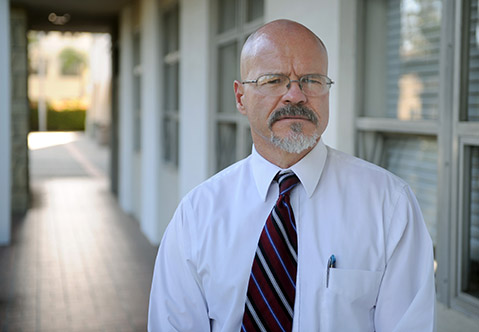A Plague of Potholes
County Streets in Dire Straits; New Taxes Floated

Cheap gas? Great. More fuel-efficient cars? Awesome. Weak gas-tax revenues when roads are falling apart? Neither great nor awesome.
When state officials last year surveyed the road conditions of California’s 482 cities and 58 counties, the results were troubling. The metric by which streets are graded — Pavement Condition Index, or PCI — has been falling since 2008. Santa Barbara County’s PCI is 60 out of 100 compared to the state’s 66. If current maintenance funding levels continue, those numbers will keep dropping over the next decade.
Fixing the potholes now rather than waiting to fix them in the future when they’re even worse would be the cheaper solution, but cheap is a relative term. To jack up California’s PCI score would require $108 billion over the next 10 years, only $30 billion of which is available. To keep Santa Barbara County’s roads from deteriorating further, Public Works needs $9 million a year. That’s not even counting our backlog of road repair, currently hovering just shy of $260 million. California’s backlog clocks in at $40 billion.
For the last 20 years, California’s gas tax to pay for this work has stayed the same: 18.5 cents per gallon. In 2015 terms, the value of that 18.5 cents has been cut in half. And in the same two decades, cars have become twice as fuel-efficient, a trend that will only escalate in the years to come. Plunging gas prices haven’t helped, either.
If the straits seem dire, they are, said Public Works Director Scott McGolpin, who presented those figures to the Board of Supervisors this week. The solutions could prove tough to swallow, as well. That $78 billion statewide shortfall, for instance, could be covered by a 54-cent-per-gallon gas-tax increase. A whole new approach embraced by Oregon — called a vehicle miles traveled tax (VMT) — would charge people based on the number of miles they drive and would require GPS tracking devices installed in cars.
For McGolpin and other experts, the time to act is now. In Santa Barbara County, Measure A “has been a godsend” and the supervisors’ vote last year to set aside $100 million over 10 years toward infrastructure is “going to be a shot in the arm,” he said, but state-level change is needed. In the interim, McGolpin said, one option could be to impose a “modest” gas-tax increase — with an expiration date — and experiment with alternatives, like the VMT. “It’s just Band-Aids and bubblegum now, holding these roads together,” he said. “We have to do something.”
McGolpin suggested looking to Oregon, which has been toying with its new VMT system for some time. Governor Jerry Brown has been looking north, too, as he set aside $9.4 million in his budget for a 6,000-person pilot program in California. McGolpin, whose car gets 38 miles per gallon on the highway, said he will be one of the first to volunteer and won’t be letting the idea of GPS monitoring his mileage get to him.
“We’ve got to get beyond that Big Brother mentality,” he said. “Everybody carries a cell phone. They, quote unquote, ‘know where you are.’ If it’s in your car, so what?” Still, he said, a “menu of options,” including allowing people to self-report their mileage, setting up different payment plans, and deciding if and how bicyclists and other road users could contribute, should be on the table.
When addressing the supervisors, McGolpin suggested they and other drivers think of a road-usage charge as it would relate to their other spending habits. With the gas tax as it is now, Californians pay an average of $368 annually, only it’s hidden at the pump. That’s less than people pay for Wi-Fi ($540), frequent lattes ($780), cell phone plans ($852), and cable television ($1,032), he argued. “Roads are like a utility,” he said. “It’s like water, it’s like sewer, it’s like electricity. You need it to survive.”
Raising the gas tax by 54 cents isn’t expected, and it wasn’t well received by the supervisors, who suggested that state legislators come up with a funding scheme similar to the county’s for its $100 million plan, whereby money will be set aside incrementally from growing property-tax revenues. Supervisor Janet Wolf suggested the board be open to all ideas. “We are so afraid to use the word ‘tax,’” she said. “We can’t complain and then say we’re not going to do anything about it.”



